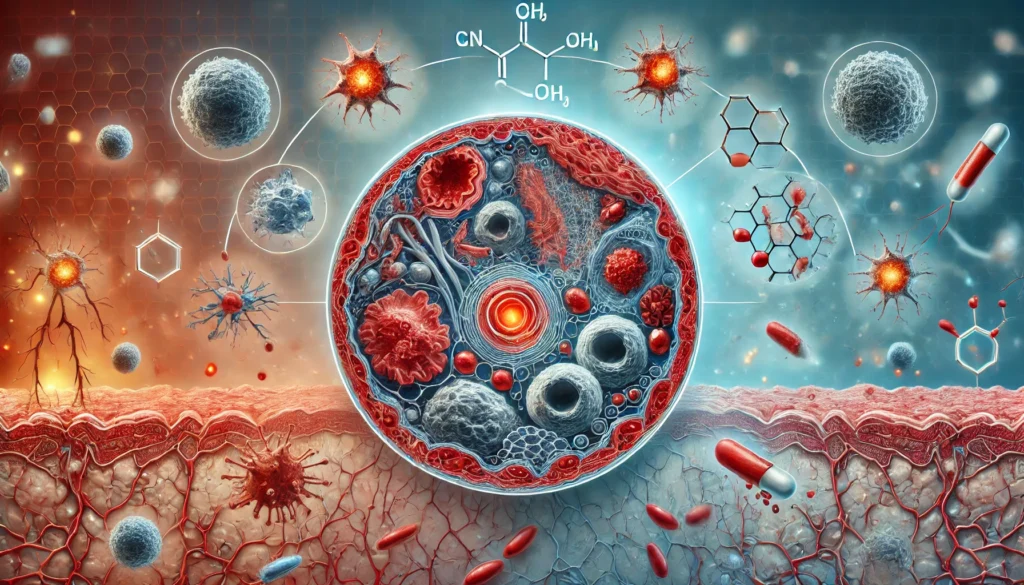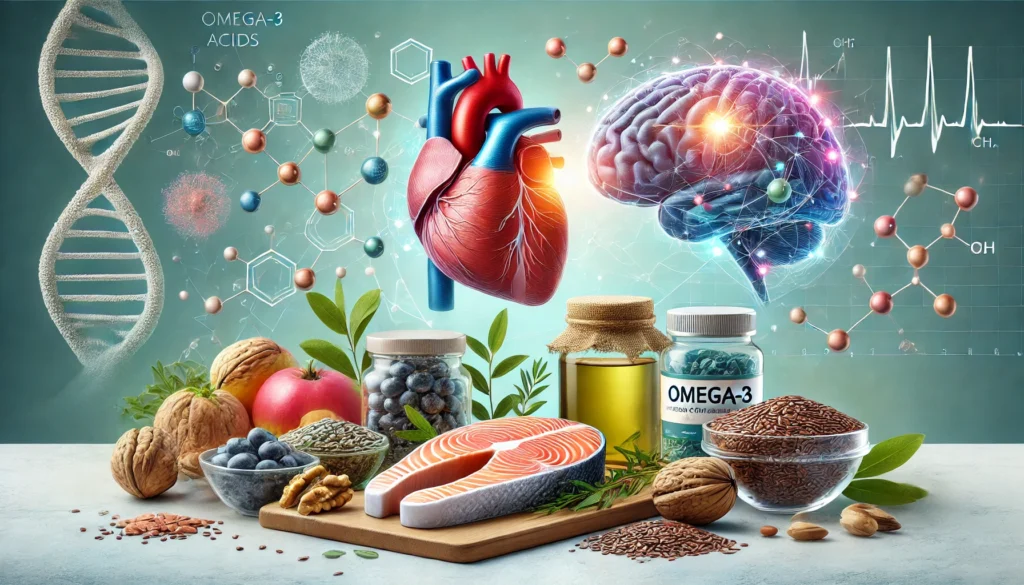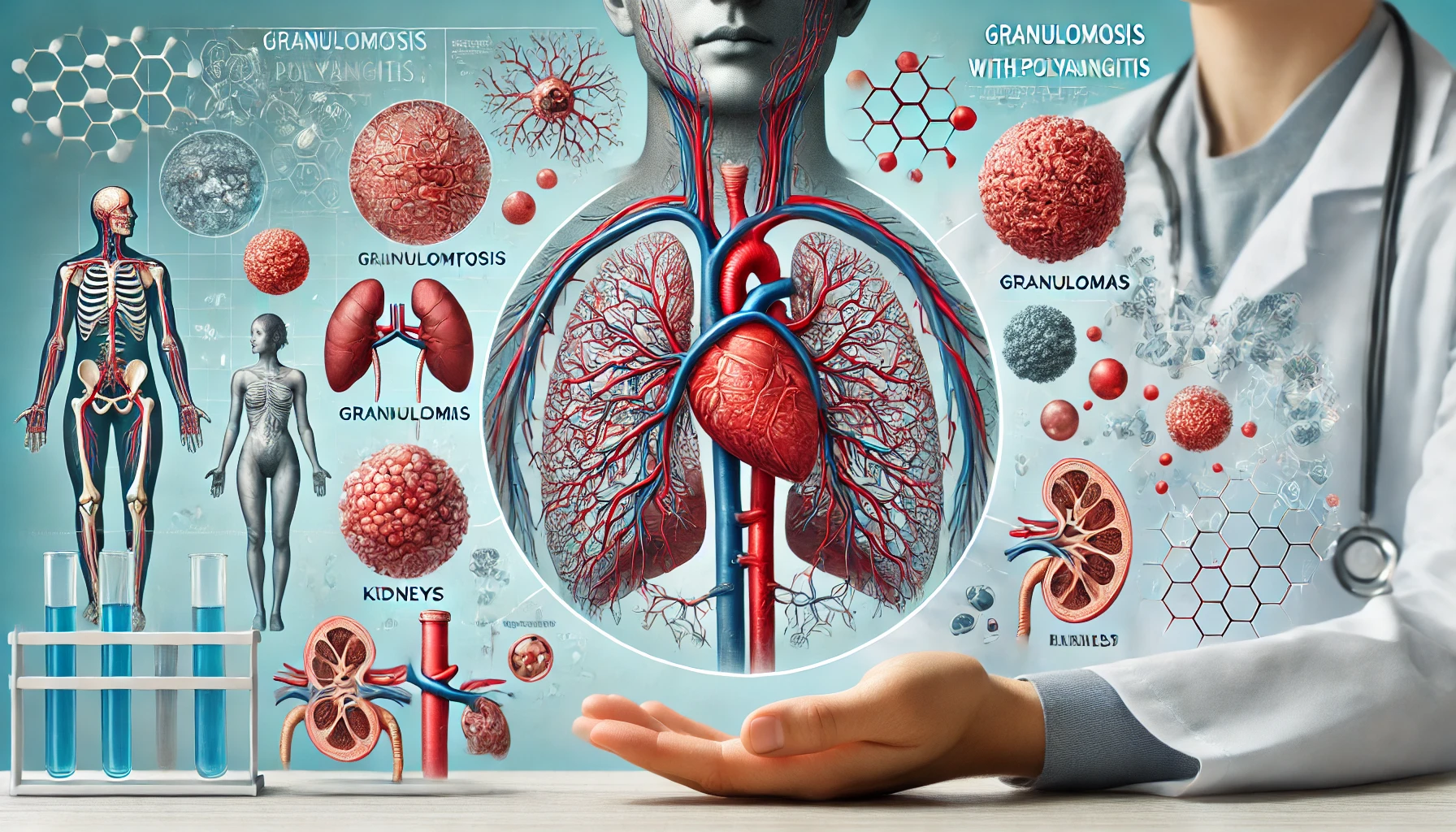Description
Granulomatosis with Polyangiitis (or GPA), formerly referred to as Wegener’s granulomatosis, constitutes a rare autoimmune disease marked by blood vessel inflammation and the development of granulomas in multiple organs. This disorder primarily affects the kidneys, lungs, and upper as well as lower respiratory tracts, though it may also impact other organs. GPA impacts several different bodily systems since it is a type of systemic vasculitis. Patients frequently arrive with symptoms like chronic sinusitis, coughing, dyspnea, joint discomfort, skin lesions, and renal issues.
Granulomas, which are immune cell clusters that cause tissue destruction in afflicted organs, are a defining feature of GPA. GPA is thought to be caused by a complex interaction of immunological, environmental, and genetic variables that result in an aberrant immune response that causes inflammation and tissue damage, even if the precise origin of the condition is yet unknown.
Symptoms and signs of a normal GPA include:
Respiratory Tract Involvement: These include the following:
- Persistent cough
- Chronic sinusitis or inflammation of the nose
- Breathing difficulties
- Bloody sputum
- Issues with the ears or eyes, like ear infections or eye irritation
Pulmonary Symptoms: These are as follows:
- Chest pain
- Hemoptysis, or the coughing up of blood
- Lung nodules
Kidney Manifestations: These involve the following:
- Urine containing blood (hematuria)
- Glomerulonephritis (swelling of the kidney’s filtration units)
- Urine containing protein (proteinuria)
Systemic Indications: These consist of:
- Tiredness
- Weight loss
- Fever
You May Also Like:
Hypogammaglobulinemia: Description, Causes, and Treatment Protocol
CREST syndrome | Limited cutaneous systemic sclerosis: Description, Causes, and Treatment Protocol
Granulomatosis with polyangiitis (GPA) / Wegener’s granulomatosis: Description, Causes, and Treatment Protocol is an original (MedNewsPedia) article.
Possible Causes
Although the specific origin of GPA is unknown, a confluence of immunological, genetic, and environmental variables is thought to be involved in its development. Several possible causes linked to the commencement of GPA include:
Immune System Dysfunction: Certain infections, especially those brought on by viruses or bacteria, have the potential to induce or worsen GPA in those who are genetically vulnerable. Although no single pathogenic agent is the cause directly, infections can trigger the immune system in such a manner that aids in the development of GPA.
Genetic Predisposition: GPA development may be influenced by genetic predisposition. Certain people may be predisposed to autoimmune disorders, including GPA, due to specific genetic variants or mutations.
Environmental Triggers: In genetically vulnerable people, some infections, especially those brought on by viruses or bacteria, might trigger or worsen GPA. Although no specific pathogenic agent is the cause directly, infections may induce the immune system to get stimulated, which could lead to the onset of GPA.
Exposure to External Elements: Sensitive people may be more susceptible to GPA triggers from specific occupational or environmental exposures, such as exposure to chemicals, dust, toxins, or silica. Nevertheless, it is unclear exactly which drugs or triggers are at play.

Exacerbating and Mitigating Factors
Multiple factors can impact the course and symptoms of granulomatosis with polyangiitis (GPA), either exacerbating or mitigating the condition. For the illness to be effectively managed, it is vital to comprehend these elements. These GPA-related aggravating and alleviating factors are as follows:
The exacerbating factors include:
Infections: Due to the increased response of the immune system, respiratory infections, especially those affecting the upper part of the respiratory system, can exacerbate symptoms of GPA and cause flare-ups.
Stress: Inflammatory reactions and the immune system’s functioning can be affected by stressful situations or ongoing stress, which may aggravate GPA symptoms.
Environmental Factors: Dust, smoke, and certain chemicals are examples of environmental contaminants that may worsen GPA symptoms and cause inflammation.
Non-compliance with Treatment: Recurrence of symptoms or an aggravation of the condition can result from irregular dosage or stopping prescription drugs without consulting a doctor.
Medications: Certain drugs may worsen GPA or cause flare-ups, especially if they impact the body’s immune response or may be hazardous to organs such as the kidneys.
The mitigating factors include:
Healthy Lifestyle: A balanced diet and frequent exercise that is customized to each person’s skills may enhance immune system performance and general well-being.
Stress Management: It may be possible to manage GPA symptoms by modifying the immunological response through the use of stress-relieving techniques such as meditation, mindfulness, or counseling.
Environmental Modifications: Reducing exposure to contaminants in the environment and possible triggers, like chemical irritants or cigarette smoke, may help lessen inflammation and worsening of conditions.
Prompt Identification and Treatment: The severity of GPA can be lessened by timely detection and early commencement of the proper treatment, which lowers the possibility of damaged organs and controls inflammation.
Continual Health Assessments: Medical professionals can monitor the course of a condition, alter treatment as necessary, and quickly address any new problems that may arise with routine check-ups.
Medication Adherence: GPA can be effectively managed and relapses can be avoided by taking prescribed drugs as instructed by medical professionals and according to the treatment plan.

Standard Treatment Protocol
A thorough treatment strategy is required for granulomatosis with polyangiitis (GPA), which usually entails standard medical procedures in addition to adjunct medicines. An extensive standard GPA treatment approach is presented here:
Immunosuppressive Therapy: These include the following:
Glucocorticoids (Steroids)
Initially, prednisolone or prednisone is frequently prescribed to rapidly reduce inflammation and regulate symptoms.
Immunosuppressants
Medications such as rituximab or cyclophosphamide are frequently used to reduce the aberrant immune response. Rituximab is a monoclonal antibody used to prevent organ damage and minimize inflammation by targeting particular immune cells. As an alternative, maintenance therapy may involve the use of more recent medicines like methotrexate or azathioprine.
Biologic Therapies: These are as follows:
Rituximab
Rituximab, as previously indicated, is a biologic treatment that specifically targets immune cells implicated in GPA.
Tocilizumab
When all other options are exhausted or poorly tolerated, a monoclonal antibody inhibiting specific inflammatory pathways may be taken into consideration.
Plasmapheresis: The removal of toxic antibodies from the bloodstream through a process called plasmapheresis may be used to treat problems such as kidney failure in situations involving severe GPA.
Management of Complications: Various therapies can be needed, depending on which organs are impacted. For example, additional drugs or treatments may be needed to address renal damage if there is kidney involvement.

Treatment Options
Options for adjunct therapy are important in bolstering traditional GPA therapies since they offer extra alleviation and may even enhance overall results. The following list of supplemental therapies could be used in addition to conventional medical treatments for GPA:
Over-the-Counter Formulations: These include nonsteroidal anti-inflammatory medications (NSAIDs) and acetaminophen, which are used to treat pain. They could aid in the management of minor pain and discomfort related to GPA.
Nutritional Supplements: While they are not regarded as the main treatments for GPA, nutritional supplements may help manage symptoms and maybe enhance general health in affected persons. Dietary supplements for GPA may be taken in addition to conventional medical care:
Antioxidants
Vitamins C and E, which are antioxidants, may help lessen inflammation and oxidative stress. It is usually advised to get ample antioxidants from a balanced diet. However, the use of supplements should be done with caution.
Vitamin D
In considering the possibility of deficits in GPA patients, supplements might be advantageous. For healthy bones and possible immune system modulation, proper vitamin D levels are necessary.
Omega-3 Fatty Acids
Fish oil supplements contain omega-3 fatty acids, which have anti-inflammatory qualities and may help reduce inflammation linked to GPA.
Probiotics
These may be beneficial in treating autoimmune diseases like GPA by regulating the immune system and promoting gut health. It is advised to choose the right strains and talk to medical professionals about probiotic use.
Natural and Herbal Remedies: Although their efficacy in particularly treating GPA has not been fully demonstrated, people may want to try these natural and herbal therapies:
Turmeric (Curcumin)
One of turmeric’s constituents, curcumin, has anti-inflammatory qualities that may help control inflammation linked to GPA. Although it may have anti-inflammatory properties, there is not much data to directly support its effectiveness in raising GPA.

Green Tea Extracts
Some of the substances included in green tea have anti-inflammatory and antioxidant qualities, which may help reduce inflammation.
Ginger
Since ginger is known to have anti-inflammatory qualities, it may be able to reduce the symptoms of inflammation. Nevertheless, there is little scientific proof to back up its immediate advantages in GPA management.
Astragalus
Although it may have immune-modulating properties, astragalus is a herb that is thought to strengthen the immune system. Uncertainty surrounds its direct effect on GPA. But, as it could conflict with some drugs or medical conditions, care should be taken.
Boswellia Serrata
Studies have demonstrated the anti-inflammatory properties of Boswellia serrata extracts, which may be a useful adjunct to traditional GPA therapies. It is essential to consult a healthcare expert regarding supplement quality and dosage fluctuations.
However, to prevent any interactions and guarantee safety, patients should always speak with their healthcare practitioners before adding any supplements or adjunct therapies to their treatment plan. The extent of the condition, the organs impacted, and the unique characteristics of each patient all influence the treatment strategy for GPA. Treatment regimens must be customized to meet the unique requirements of each patient.
Conclusion
Granulomatosis with polyangiitis (GPA), previously known as Wegener’s granulomatosis, is a rare but serious autoimmune condition characterized by systemic vasculitis and granuloma formation, primarily impacting the respiratory system, kidneys, and other organs. While its exact causes remain uncertain, a combination of immune dysfunction, genetic predisposition, and environmental triggers appears to contribute to its onset. Standard treatment protocols, including immunosuppressive therapies, glucocorticoids, and biologic agents, remain crucial for managing inflammation and preventing organ damage.
Adjunct therapies, such as nutritional supplements, natural remedies, and lifestyle modifications, offer additional support in managing symptoms and improving overall well-being. However, these complementary approaches must be integrated with conventional medical treatments under professional guidance to ensure safety and effectiveness. Early diagnosis, timely intervention, and adherence to treatment protocols are critical for controlling GPA and minimizing long-term complications. With a comprehensive, personalized treatment plan, individuals affected by GPA can achieve improved outcomes and enhanced quality of life.

Additional resources for further reference
https://www.ncbi.nlm.nih.gov/books/NBK557827
https://pubs.rsna.org/doi/full/10.1148/rg.2021210132
https://link.springer.com/chapter/10.1007/978-981-16-4047-6_1
https://onlinelibrary.wiley.com/doi/full/10.1111/1754-9485.13471
Important Note: The information contained in this article is for general informational purposes only, and should not be construed as health or medical advice, nor is it intended to diagnose, prevent, treat, or cure any disease or health condition. Before embarking on any diet, fitness regimen, or program of nutritional supplementation, it is advisable to consult your healthcare professional in order to determine its safety and probable efficacy in terms of your individual state of health.
Regarding Nutritional Supplements Or Other Non-Prescription Health Products: If any nutritional supplements or other non-prescription health products are mentioned in the foregoing article, any claims or statements made about them have not been evaluated by the U.S. Food and Drug Administration, and such nutritional supplements or other health products are not intended to diagnose, treat, cure, or prevent any disease.


